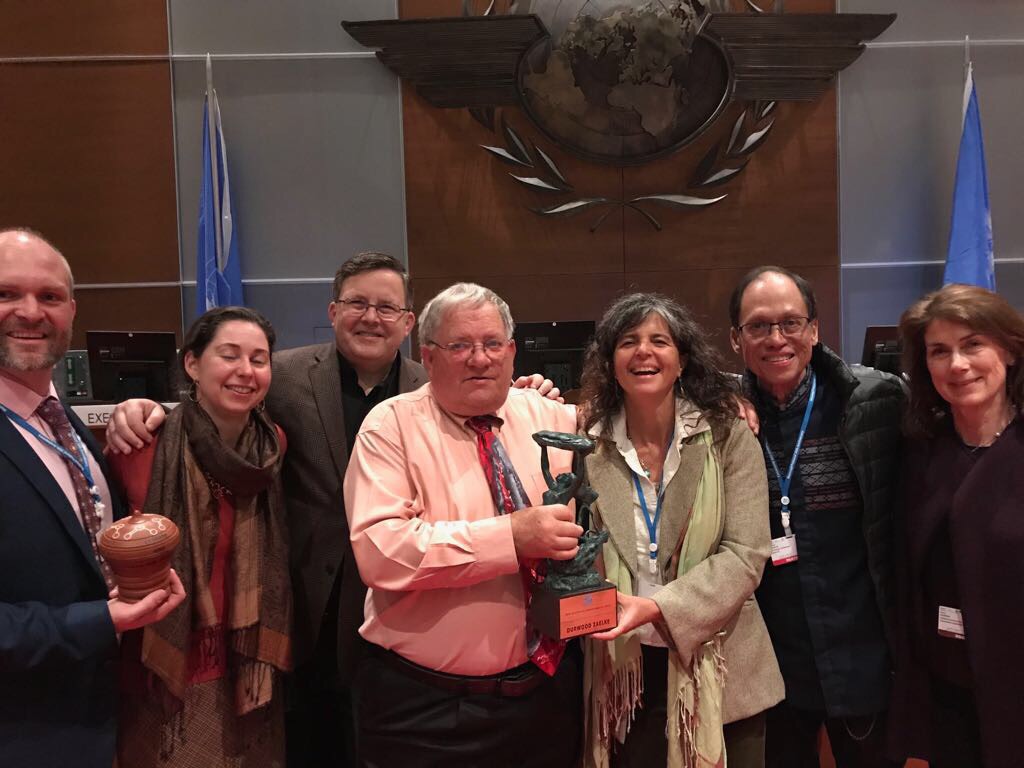UN Environment Honors IGSD and Collaborators for Climate Work

Ceremony at 30th Anniversary of Montreal Protocol
IGSD and its collaborators were among those honored at this year’s 30th-anniversary Meeting of the Parties to the Montreal Protocol, where UN Environment recognized individuals, Parties, and organizations who have made extraordinary contributions to the progress and achievements of the Montreal Protocol, widely regarded as the world’s most effective environmental treaty.
IGSD President Durwood Zaelke and IGSD Director of Researcher Dr. Stephen O. Andersen each received the Montreal Protocol Policy and Implementation Leadership Award for their respective contributions towards gathering consensus and rallying political momentum behind the Kigali Amendment (the only NGOs to have been presented with this award).
The Kigali Amendment, agreed at last year’s Meeting of the Parties in Kigali, Rwanda, will avoid the equivalent of 80 to 105 billion tons of CO2 by 2050, and up to 0.5°C of warming by 2100, making it the single most significant contribution to keeping warming within the Paris Agreement goals of staying well below 2°C above pre-industrial levels, aiming for the still safer 1.5°C.
IGSD also shared a Scientific Leadership Award as part of the “Velders Team” led by Dutch scientist Dr. Guus J.M. Velders for their pioneering research on the climate benefits of the Montreal Protocol and their efforts to build the scientific foundation for the 2007 Adjustment to the Protocol accelerating the HCFC phaseout and the 2016 Kigali Amendment to phasedown HFCs.
The scientists earning the award include Dr. Guus J.M. Velders, Dr. Stephen O. Andersen, Dr. John S. Daniel, Dr. David Fahey, and Dr. Mack McFarland. Zaelke and Marco Gonzalez, former Executive Secretary of the Montreal Protocol Secretariat, were included in the Scientific Leadership Award with the Velders Team for their work communicating and promoting the team’s scientific findings to the public and policymakers. The Velders Team inspired other scientific papers leading to an improved understanding and appreciation of the climate impacts of CFCs, HCFCs, and HFCs. Earlier this year, Guus Velders also was selected by Time Magazine as one of the 100 most influential people of 2017.
“IGSD is proud to have played a role in the acceleration of the HCFC phaseout and adoption and ratification of the Kigali Amendment and we continue to encourage all countries to ratify as soon as possible,” Dr. Andersen said. “To receive this award during the 30th Anniversary of the Montreal Protocol, the most successful environmental treaty ever, is a high honor. We are confident that through the Kigali Amendment, the Montreal Protocol will do for HFCs what it has successfully done to reduce nearly 100 ozone-depleting greenhouse gases.”
“The Kigali Amendment is the single largest contribution to date to keep warming from breaching the 1.5° C barrier”, said Zaelke. “It’s safe to say that the world could not have achieved this without the Velders Team.”
Others honored at the 30th Anniversary award ceremony include Oak Ridge National Laboratory and the International Expert Panel for their study on Alternative Refrigerant Evaluation for High-Ambient-Temperature Environments. Dr. Suely Machado Carvalho, a frequent IGSD collaborator, co-chaired the International Expert Panel with Dr. Patrick Phelan, and Dr. Omar Abdelaziz led the study.
Awards also were presented to the American Society of Heating, Refrigeration and Air-Conditioning Engineers, the Environmental Investigation Agency, and the Alliance for Responsible Atmospheric Policy. Awards for Best Media Coverage went to Jianming Chen, Down To Earth, and Windfall Films, and BBC. The Windfall Films’ series on the success of the Montreal Protocol includes The Ozone Hole, a film featuring interviews with Zaelke and Andersen, among others. The Ozone Hole had its opening in Montreal the night before the Awards and will air next year on BBC.
The Policy Leadership award depicts the Chinese Goddess Nüwa who smelted a seven-color stone to block a hole in the sky to repair the wall of heaven. A 3.9-meter high sculpture of Nüwa was produced by celebrated artist Yuan Xikun for the 25th Anniversary of the Montreal Protocol, who chose the figure to draw parallels with modern-day challenges of ozone depletion and climate change. The statue was unveiled at the UN offices in Vienna.
The Ozone Secretariat's Ozone Awards 2017 homepage is here. Biographies of recipients of the Ozone Awards 2017 are here.